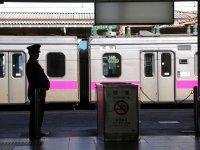 Niigata train gets in at 20.07
Niigata train gets in at 20.07Nagaoka train leaves at 20.12
Would I make that in Britain?
Would I hell!
I leave the three mountains behind and set my sights to the south. Leaving Tsuruoka at 18.30 I plunge down the coastal plains of the Inland Sea, shrugging off Children-Desert-Parents, Send-Back-the-Dog, Turn-Back-the-Horse, those fearsomely dangerous places in Basho’s day where outriders of the high mountains thrust themselves out into the sea. There were no kilometre long tunnels through them then, no highways built out over the ravening waves on concrete stilts. Travellers had to time their passage precisely in order to not get swept off into the sea or crushed against the rocks.
I g
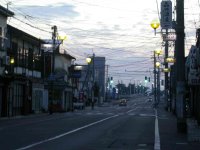 et into Nagaoka at 23.00 and doss in the waiting room, sleeping scarcely a wink. At first light I leave the station and head for the Inland Sea. The sun is coming up and the Japanese Alps are ranked upon rank on the city horizon. I touch the water – it’s as warm as a warm bath. I've made it across the width of Japan!
et into Nagaoka at 23.00 and doss in the waiting room, sleeping scarcely a wink. At first light I leave the station and head for the Inland Sea. The sun is coming up and the Japanese Alps are ranked upon rank on the city horizon. I touch the water – it’s as warm as a warm bath. I've made it across the width of Japan!I leave the Basho trail for a while to explore Kyobe-kyo, a gorge extending up into the Japanese Alps. The mainline train takes me to to Unazuki-onsen, then I change to a narrow-gauge train which goes up the gorge. The orange mini-train was built to transport wo
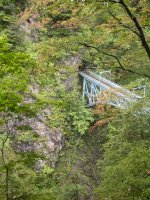 rkers building the dams and hydro-electric works scattered along it (including one in the shape of a medieval European castle) but now serves the tourist trade. Probably every river in the Japan is pressed into hydro-electric duties.
rkers building the dams and hydro-electric works scattered along it (including one in the shape of a medieval European castle) but now serves the tourist trade. Probably every river in the Japan is pressed into hydro-electric duties.Kuronagi-onsen Ryokan is a 3/4hr ride then a 20 minute hike on a butterfly’d path hanging off the edge of a side gorge, descending to the ryokan built on the only flattish spot arou
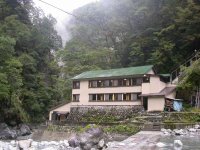 nd, cuddled next to the stream. From my window the view is of two waterfalls and the crystal clear river itself, flowing over stones (but also, unfortunately, of power cables and a small artificial dam). Precipitous slopes climb up on both sides, thickly forested. There is no sound but that of the river.
nd, cuddled next to the stream. From my window the view is of two waterfalls and the crystal clear river itself, flowing over stones (but also, unfortunately, of power cables and a small artificial dam). Precipitous slopes climb up on both sides, thickly forested. There is no sound but that of the river. feel lonely
do zazen
sound of water
This poem says that when you do zazen there is no separation. ‘Sound of water’ and ‘zazen’ are not separate. To talk about things, relate to them in the human world, we separate them out, name them, make them into pictures on the TV screen in our heads. To be human is to be ever separate .. or is it?
feel lonelyWe are, as Rainer Maria Rilke would have it, ‘turned-around Beings’. “…denn schon das fruehe Kind wenden wir um und zwingens, dass es ruckwarts Gestaltung sehe, nicht das Offne, das im Tiergesicht so tief ist. Frei von Tod…” (…We take even the youngest child, turn him around and force him to look backwards at appearances, not that openness so deep within an animal's face. Free from death;)
do zazen
sound of water
“… Wir haben nie, nicht einen einzigen Tag, den reinen Raum vor uns, in de
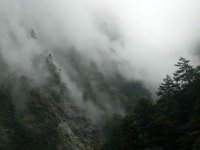 n die Blumen unendlich aufgehn. Immer ist es Welt and niemals Nirgends ohne Nicht: das Reine, Unueberwachte, das man atmet and unendlich weiss…” (…Not for a single day, no, never do we have that pure space ahead of us, into which flowers endlessly open. It is always World and never Nowhere without No: that pure, unguarded space we breathe, always know…)
n die Blumen unendlich aufgehn. Immer ist es Welt and niemals Nirgends ohne Nicht: das Reine, Unueberwachte, das man atmet and unendlich weiss…” (…Not for a single day, no, never do we have that pure space ahead of us, into which flowers endlessly open. It is always World and never Nowhere without No: that pure, unguarded space we breathe, always know…)Humans – us – form ‘concepts’ in our heads, then we ‘systematize’ them, congeal around these systems and call them ‘beliefs’, ‘customs’, ‘the right way of life’. Everything, even Rilke’s “Reine, Unueberwachte” (the pure, that which is not guarded, kept under supervision or surveillance) becomes part of a code … dis-placed. This happens everywhere, in every coming together of humans: Buddhist, Shinto, Christian, Jewish. ‘The New’ arises spontaneously, instantaneously – but is immediately codified. Das Reine, Unueberwachte…
Buddhist Ethics is very simple. It consists in doing the right thing in the right place at the right time. When is the right time? NOW! Where is the right place? HERE! What is the right thing to do? What you do HERE and NOW! Sin and guilt – the things Christendom uses to keep you in your place?
Back at Kuronagi-onsen Ryokan I grab my towel and head for the rotemburo (a mixed open-air hot bath). Thi
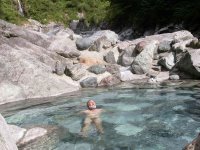 s one's right by the side of the river, set amongst large boulders and steaming hot. No-one in it. Damn. No naked women. I strip, wash by the river and jump in … AHHHHHHHHHHH!!!
s one's right by the side of the river, set amongst large boulders and steaming hot. No-one in it. Damn. No naked women. I strip, wash by the river and jump in … AHHHHHHHHHHH!!!No kappas around, - that’s good. 'Kappas' are sprites who inhabit mountain pools. They (reputably) pull your liver down through your arse and eat it. They have a cavity on top of their heads which contains water, and it's from this that they derive their magical power. Fortunately, all you have to do if you meet a kappa is bow deeply to it. As it's Japanese, it's compelled to bow deeply in return, on which the water in the cavity runs out, it loses its magical powers, and it can't eat your liver. That’s OK, then.
I have a nice hot soak, return to the ryokan and have a long snooze

leaving Kuronagi-onsen
light-brown frogs
jump out of my way

1 Comments:
Hi Ralph!
Nice blog, can you update it?
I'll put a link on Area 17 if you like?
all my best,
Alan
Post a Comment
<< Home